- New biography tries to set Beatles record straight
- Author Mark Lewisohn's "Tune In" is exhaustive, and just first volume of three
- Beatles can be heard at career's beginning on new album of BBC recordings
- The group may have been groundbreaking, but they were still just people, says Lewisohn
(CNN) -- The story of the Beatles has taken on the power of myth.
Today, five decades after Beatlemania erupted, it seems almost inevitable, a magical confluence of talent and timing. A group of scruffy musicians from Liverpool, a depressed port in northern England, become the biggest band in the world, known on a first-name basis? They put out album after groundbreaking album, their influence as great as their popularity? They dominate the pop culture of the 1960s and break up while still at the top of their game?
You couldn't make this stuff up.
But there's been enough mythmaking, says Mark Lewisohn. It's time to get down to the facts.
"It's a story that's lost all its excitement, because it's been trodden down through too many bad tellings through the years," says Lewisohn, the Beatles historian and author of such detailed works as "The Beatles Recording Sessions" and "The Beatles Chronicle." "I just felt I would disregard everything that's been done. I would start again."
The result is "Tune In," a mammoth (800 pages, not including notes) biography of the Fab Four that's just the first of a projected three-volume work. The book ends in 1962, with the band on the cusp of stardom. (For those who really can't get enough detail, there's an "Extended Special Edition" available in Britain that runs 1,728 pages and retails for £120 -- about $190.)
Lewisohn, 54, has immersed himself in original documents, listened to and read contemporary accounts and interviewed those who were there, all those years ago. He compares the work to Robert Caro's equally monumental biography of Lyndon Johnson, which is now four volumes long and has just started the story of LBJ's presidency.
"This is a proper work of history," he says. "And it needs to be done, and it needs to be done now, while the witnesses are still with us -- most of them -- and while access to archives is still possible."
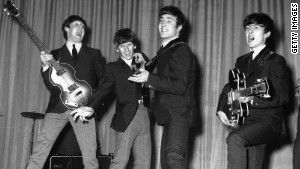
He's emphatic that "Tune In" isn't a hagiography, the literary version of a Beatles concert's high-pitched screams.
"It's not about legends, it's not about icons, it's not about myths," he says. "The book is anti-myth."
A little bit raw
Ah, but it's a season for myths. American media is currently drowning in biographies and retrospectives linked to the 50th anniversary of the JFK assassination, and for all the attempts at hard-nosed history, it's still challenging to watch videos of the youthful president and not be swept away by the yearning, emotional pull of what-might-have-been.
The Beatles, too, have become encrusted by an aura of nostalgia and wonder, as if subjects of an ancient legend.
Lewisohn is far from the first to try to get underneath the shell. Hunter Davies wrote an authorized take in the late '60s; Philip Norman published the essential "Shout!" in 1981. Just seven years ago, Bob Spitz published "The Beatles: The Biography," which is just as massive as "Tune In."
As the 50th anniversary of their "Ed Sullivan Show" debut nears on February 9, the marketplace fills with more -- not just books, but also a new music release.
The 2-CD set, "On Air -- Live at the BBC Volume 2," may in its own way be as revelatory as the books.
Here are the Beatles from 1963, when they were still a little raw, driving the motorways of Britain in the era's version of an Econoline van to fulfill the latest one-nighter on their concert schedule. For the BBC, Britain's broadcasting monolith, the group was energetic and eager-to-please, says Kevin Howlett, who helped put together the collection. It's a sequel to the recently re-released and remastered "Live at the BBC," which originally came out in 1994.
For one recording, during a bitter, snowy winter, they did a show in Bristol and then drove to London -- a two-hour trip on a good day -- for their BBC take the next morning. Another day they recorded 18 songs in seven hours for the BBC's "Pop Go the Beatles." Later they did 19 songs in a single long session. The BBC didn't play many records, so it was perform live or nothing.
"They knew they only had one shot, really," says Howlett, who's also written a companion volume, "The Beatles: The BBC Archives." "You hear how proficient they are as a live group -- not only doing the unusual repertoire (of covers on the earlier BBC album), but doing their own songs."
'The biggest nickers in town'
Indeed, they were amazingly versatile. One song on the CD, "Beautiful Dreamer," is a Stephen Foster classic rearranged for Tony Orlando in late 1962, but didn't come out in Britain until January 1963. The Beatles somehow obtained a copy -- it probably helped that their manager, Brian Epstein, managed a record store -- quickly learned it and performed it on a broadcast.
They were also known to adapt American favorites for cover versions or to give them ideas for originals. Those kinds of talents are what set the Beatles apart from their competition, says John Covach, the director of the Institute for Popular Music at the University of Rochester, who's taught courses on the group.
Covach mentions a variety of early songs -- "She Loves You," "I Want to Hold Your Hand," "If I Fell" -- that start out with fairly conventional structures but always have a twist somewhere: a drop to a minor chord, a leap to a high note.
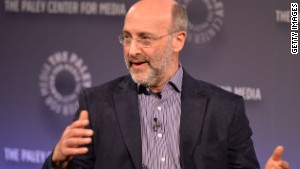
"Most of what's going on is something you'd hear routinely in even the most mediocre of pop songs," he says. "But they twist it a bit and they come up with something that's innovative without seeming like it's totally strange."
The Beatles freely admitted borrowing from others. They had "big ears," in the jargon of music aficionados -- they'd listen to anything -- and tried to write their own versions of American hits. After all, their Liverpool colleagues were doing the same covers the Beatles did.
"We were the biggest nickers in town," Paul McCartney told Playboy in 1984. "Plagiarists extraordinaires."
Though the songs came in handy for their own group, even McCartney and John Lennon were under no illusions that the Beatles would last. Their long-term goal was to simply be songwriters for others, after all.
"When they came to America, the people they most wanted to meet were people like Carole King and Gerry Goffin -- the Brill Building," Covach says. "This was all really about setting up a lifetime of writing songs and being involved in pop culture in a fairly old-school way. It kind of morphed into something else."
'They never existed in isolation'
Of course, that's what leads to the present mythology -- the "something else."
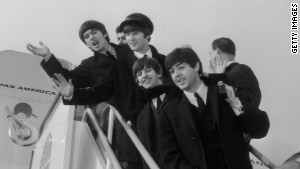
It's all become wrapped up in a ball by now: the cheeky press conferences, the madcap lads of "A Hard Day's Night," the psychedelic savants of "Tomorrow Never Knows," the Apple business and the fade-out -- not to mention the tragic deaths of Lennon's friend Stu Sutcliffe, manager Brian Epstein and Lennon himself.
Even the parodies -- National Lampoon's "Magical Misery Tour," Mark Shipper's 1978 novel "Paperback Writer," the Rutles -- have somehow buffed the legend instead of undermining it. No wonder there are entire festivals devoted to all things Beatle, and have been for decades.
For Lewisohn, the biographer, that just means digging deeper to get to the heart of it all.
"In life, there are those people who are always sticking their hand up saying, 'Come and see me,' and maneuvering themselves more centrally into a story there weren't so central to in the first place, and then there are other people who don't put their hand up at all," he says. "You have to gain their trust, but then they'll tell you fantastic things. And then a key element is not believing everything people tell you, because people embroider things." (For those who want to share their Beatle-related stories, he has a page on his website for contributions.)
After he returns to his writing desk, he believes he has several years ahead of him. Volume 2 is 40% done; Volume 3 might be 10%. He expects the entire project may take to the end of the decade.
Through it all, he's maintained great admiration for the group, of course -- they've been his life's work. But he's careful to separate the men from the myth.
"They never existed in isolation. They were always in the mix with other people," he says. "They're not legends. They're just people."
In that, he echoes none other than John Lennon himself from his 1970 Rolling Stone interview.
"We were four guys. I met Paul, said 'want to join me band.' Then George joined, and then Ringo joined," he said. "We were just a band who made it very, very big. That's all."
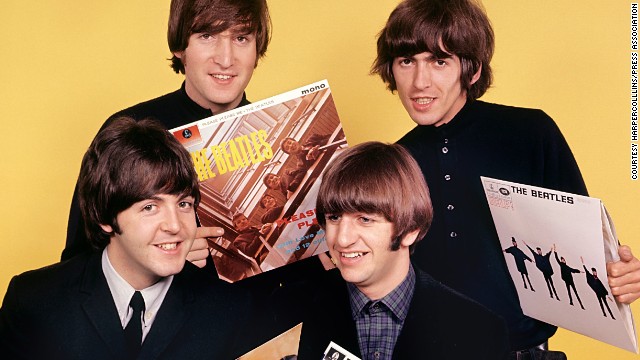 Over the years, the facts of the Beatles' story have sometimes been shoved out of the way by half-truths, misconceptions and outright fiction. Here are a few details you might have heard, with the true story provided by
Over the years, the facts of the Beatles' story have sometimes been shoved out of the way by half-truths, misconceptions and outright fiction. Here are a few details you might have heard, with the true story provided by 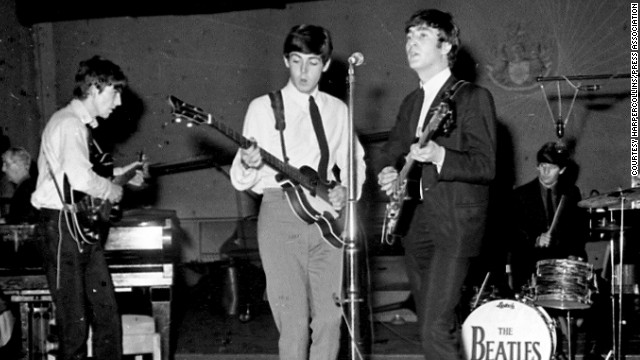 John Lennon once said that Ringo Starr not only wasn't the best drummer in rock, he
John Lennon once said that Ringo Starr not only wasn't the best drummer in rock, he 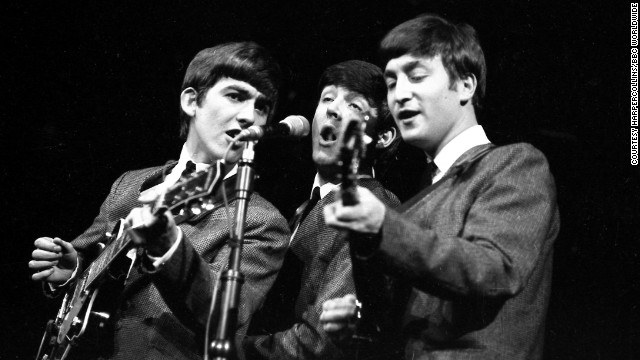 The Beatles were against wearing suits. Again, not true, says Lewisohn. Though Lennon later trashed the neat look as a sellout demanded by manager Brian Epstein, in the early '60s they were eager for a change. "I just saw it as playing a game," said Harrison. "I'll wear a f****** balloon if somebody's going to pay me!" said Lennon.
The Beatles were against wearing suits. Again, not true, says Lewisohn. Though Lennon later trashed the neat look as a sellout demanded by manager Brian Epstein, in the early '60s they were eager for a change. "I just saw it as playing a game," said Harrison. "I'll wear a f****** balloon if somebody's going to pay me!" said Lennon.
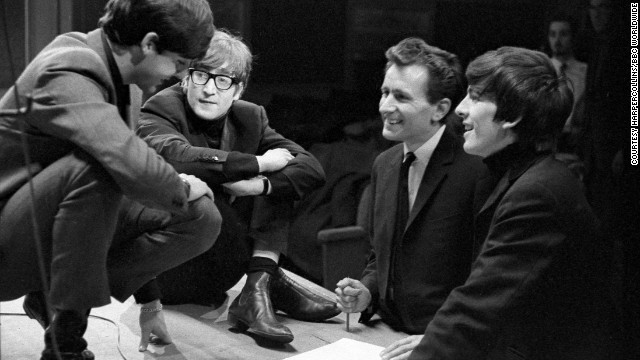 They grew up poor. Not really. Harrison's and McCartney's families were working class, and Lennon's childhood included trips to a upscale relative's house in Scotland. Only Starr, who was also sickly, grew up in poverty, in the blighted Dingle neighborhood.
They grew up poor. Not really. Harrison's and McCartney's families were working class, and Lennon's childhood included trips to a upscale relative's house in Scotland. Only Starr, who was also sickly, grew up in poverty, in the blighted Dingle neighborhood.
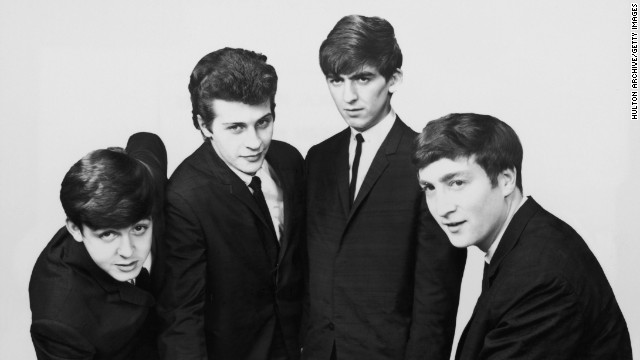 They booted drummer Pete Best out of jealousy. Producer George Martin wasn't impressed by Best (second from left), and McCartney has said he "was holding us back." The rest of the Beatles were equally unsentimental. Ringo Starr, who had played with the Beatles occasionally, was a far better drummer -- and when he joined, "from that moment on, it gelled," said Harrison.
They booted drummer Pete Best out of jealousy. Producer George Martin wasn't impressed by Best (second from left), and McCartney has said he "was holding us back." The rest of the Beatles were equally unsentimental. Ringo Starr, who had played with the Beatles occasionally, was a far better drummer -- and when he joined, "from that moment on, it gelled," said Harrison.
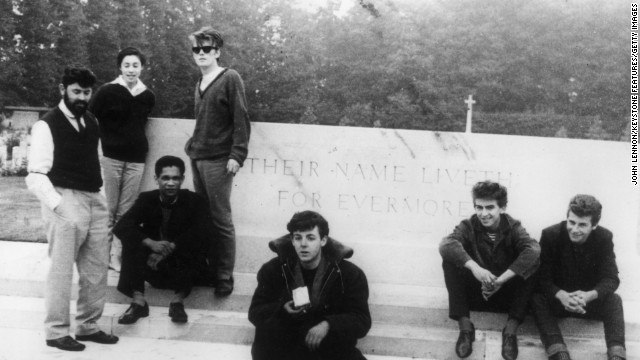 Stu Sutcliffe was a terrible bassist. Though Sutcliffe (standing, third from left) was no McCartney, he went from complete neophyte to solid rhythm player during the band's Hamburg days. He left the job because he wanted to pursue his painting, and McCartney remembers being "lumbered with" the position as new bassist.
Stu Sutcliffe was a terrible bassist. Though Sutcliffe (standing, third from left) was no McCartney, he went from complete neophyte to solid rhythm player during the band's Hamburg days. He left the job because he wanted to pursue his painting, and McCartney remembers being "lumbered with" the position as new bassist.
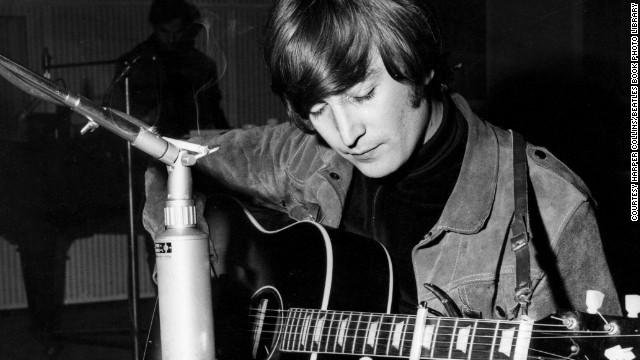 John Lennon saw his mother, Julia, killed in front of him. Julia Dykins, as she was known after her marriage to Bobby Dykins, died on July 15, 1958. After a chat with her sister, John's Aunt Mimi, she went to catch a bus and was hit by a car crossing Menlove Avenue. John found out about her death later that day.
John Lennon saw his mother, Julia, killed in front of him. Julia Dykins, as she was known after her marriage to Bobby Dykins, died on July 15, 1958. After a chat with her sister, John's Aunt Mimi, she went to catch a bus and was hit by a car crossing Menlove Avenue. John found out about her death later that day.
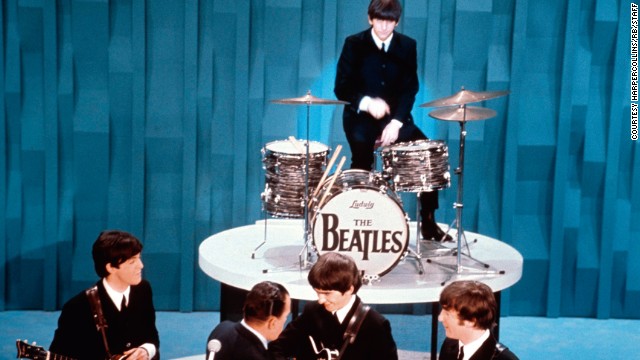 The Beatles made their U.S. television debut on "The Ed Sullivan Show," February 9, 1964. It was the band's first U.S. television performance, but they'd already been seen on American TV during a CBS News segment in December, 1963. Pieces from the segment also ran on Jack Paar's talk show in January 1964.
The Beatles made their U.S. television debut on "The Ed Sullivan Show," February 9, 1964. It was the band's first U.S. television performance, but they'd already been seen on American TV during a CBS News segment in December, 1963. Pieces from the segment also ran on Jack Paar's talk show in January 1964.
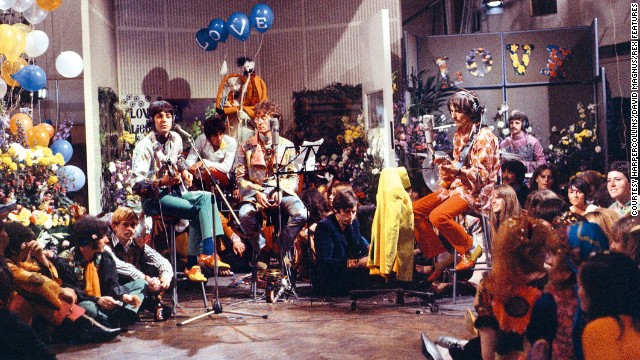 The title "Lucy in the Sky with Diamonds" is a reference to LSD. Though its imagery of "plasticine porters" and "kaleidoscope eyes" owes a lot to drugs (as well as John Lennon's fondness for Lewis Carroll-esque absurdity), the song was inspired by a drawing made by Lennon's son, Julian.
The title "Lucy in the Sky with Diamonds" is a reference to LSD. Though its imagery of "plasticine porters" and "kaleidoscope eyes" owes a lot to drugs (as well as John Lennon's fondness for Lewis Carroll-esque absurdity), the song was inspired by a drawing made by Lennon's son, Julian.
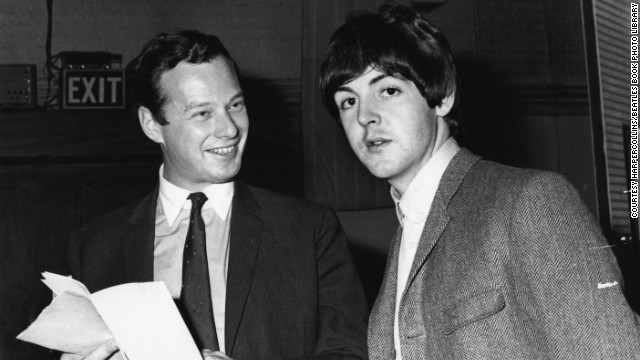 "Paul is dead." An elaborate theory -- perhaps best explained by
"Paul is dead." An elaborate theory -- perhaps best explained by 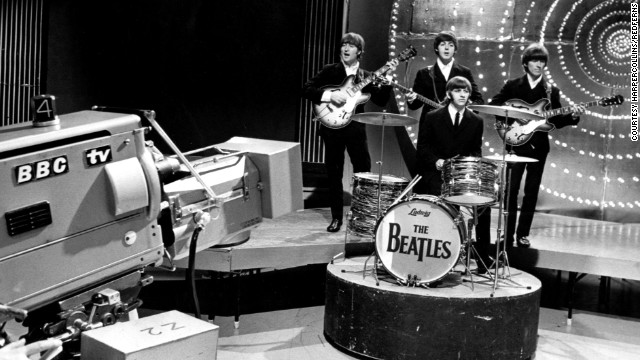 The Beatles performed on Johnny Carson's "Tonight Show." Lennon and McCartney
The Beatles performed on Johnny Carson's "Tonight Show." Lennon and McCartney 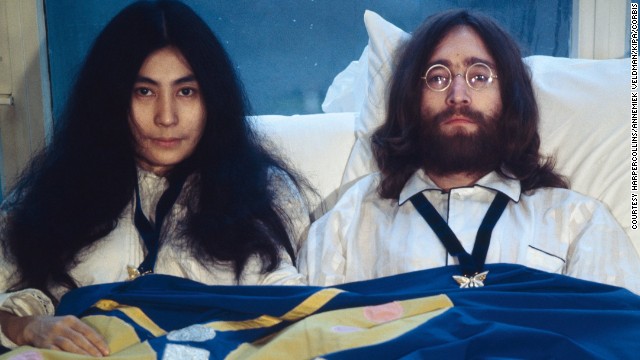 Yoko Ono broke up the Beatles. Oh, if only Yoko hadn't stolen John away from the group, they would have stayed together! Right. Actually, the Beatles were already fragmenting -- Ringo temporarily left during the making of the White Album, and George walked out during the "Get Back" sessions -- and financial issues were getting in the way of the music. Lennon was ready for something new, but everybody was tired.
Yoko Ono broke up the Beatles. Oh, if only Yoko hadn't stolen John away from the group, they would have stayed together! Right. Actually, the Beatles were already fragmenting -- Ringo temporarily left during the making of the White Album, and George walked out during the "Get Back" sessions -- and financial issues were getting in the way of the music. Lennon was ready for something new, but everybody was tired.











